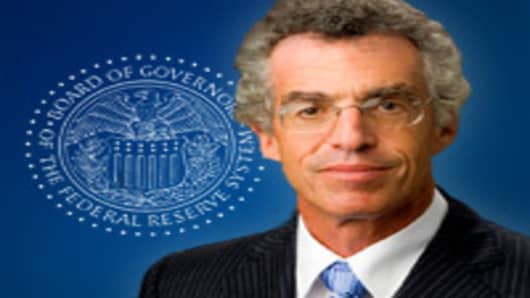A prolonged period of tepid economic growth will negate any need for the Federal Reserve to raise rates well into the future, former central bank governor and Columbia University economics professor Frederic Mishkin told CNBC.
Continued problems with banks and other areas of the economy will keep growth to a minimum for as much as three years, Mishkin said, echoing forecasts of a "new normal" from economists who don't see inflation as a threat.
- Click Here to Watch Mishkin Interview
"The most important thing is it looked like we've dodged a bullet. The recession looks like it's over, a sustained recovery is getting into place," Mishkin said in a live interview. "Nonetheless, there are still a lot of problems in the financial sector that are going to take a long time to work out."
Mishkin, who served on the Fed from 2006 to 2008, was a proponent of the central bank setting specific targets for inflation, a stand that Fed Chairman Ben Bernanke also has endorsed. The two men wrote a book on the subject that was published in 2001.
Economists favoring a stronger dollar have been calling for the Fed to raise rates both to strengthen the US currency and fend off inflation that could come from the vast amounts of liquidity the central bank has pumped into the financial system over the past two years.
"We're going to have a tremendous amount of slack in the economy for quite a number of years," he said. "If there's still a lot of slack there's no reason to raise rates. In fact, it would be a big mistake."
The Fed also may have learned a lesson from Japan's central bankers, who raised rates following the nation's so-called "lost decade" of the 1990s.
"They were so anxious to normalize and get rates positive that they raised them in early 2000 and it was a huge mistake and actually led to continuing deflation in Japan," Mishkin said. "The Federal Reserve is not going to make that kind of mistake."
Mishkin acknowledged that an acceleration in growth could change the Fed's perspective but said strong inflation is unlikely.



